- Home
- Jane Arbor
The Other Miss Donne
The Other Miss Donne Read online
THE OTHER MISS DONNE
by
JANE ARBOR
Carey had not got herself the job as social hostess at Randal Quest's hotel at Hassi Ain—it had been her sister Rosalie pretending to be Carey. So, when Rosalie eloped from Hassi Ain with Randal’s brother, and Carey then turned up, Randal scented a plot.
Plot there certainly had been—but could it really be that Carey knew nothing about it?
CHAPTER ONE
As the small aircraft climbed above patchy cloud-cover, heading east along the North African coast, its passengers adjusted themselves variously to the confines of its narrow cabin for the short flight to its touchdown at Hassi Ain.
When the take-off warning light flicked out, Carey took from her bag the letter with the Moroccan postmark which had brought her on this impetuous hurry to her sister Rosalie’s aid. By now she knew the letter almost by heart, but still read it again, feeling the same mingled indignation and pity as when it had awaited her on her return to their shared London flat, to find Rosalie gone ... to a hitherto unheard-of Hassi Ain, from which the letter had been sent.
Preoccupied in a sea of tissue paper as she packed for her marriage at the weekend, their flat-mate, Myra Grant, had been able to supply a little flesh to the bare bones of the news Rosalie’s letter had contained.
Yes, of course, Myra said, she knew Rosalie had met and fallen hard for this boy, Martin Quest, as he had for her. He had just finished this course in hotel management, and though he really wanted to paint, he had been hauled back instead to manage the luxury hotel in Morocco owned by his elder brother, Randal.
This, Myra continued, had reduced Rosalie to a wet rag of misery, and all Myra had been able to do was to make sympathetic noises until, by one of those chances that aren’t supposed to happen, a vacancy for a social hostess to this very Hotel El Gara had come on to the files of the Cosmo Employment Bureau where she worked. Knowing—or thinking she knew—that Rosalie’s experience as an assistant in a Chelsea antique shop didn’t add up, Myra had only casually mentioned the hostess job in passing. But then—surprise, surprise!—Rosalie had not only applied but had got it; had left hotfoot for Morocco for a reunion with the boy-friend, and how, Myra had concluded aggrievedly, was she to know Rosalie had simply done a flit, without keeping Carey posted on the whole affair?
So Myra hadn’t known the crazily guilty thing Rosalie had done in order to measure up to a job for which she had no conceivable fitness; that she would never have got unless—! Thankful that some instinct of loyalty to Rosalie had warned her to keep the actual contents of Rosalie’s letter to herself, Carey had apologised for supposing Myra must have aided and abetted Rosalie’s flight—an amend which Myra had grudgingly accepted as being no more than her due. True, she had asked idly what was Rosalie’s further news of herself. But Carey, warned, had managed to sidestep. She hadn’t betrayed Rosalie to Myra and wouldn’t have to now, now that Myra’s departure to be married in Canada had probably parted the three of them for good.
There remained for Carey to face the consequences of Rosalie’s desperate trick—in pitiful tatters now—the shameful story of which was there in the letter which had been Rosalie’s cry for help from Carey; the appeal which, little as Rosalie might deserve help, Carey was on her way to answer. As she always had run to Rosalie in trouble. As she probably always would...
The heat and stuffiness of the passengers’ cabin built up to discomfort, but presently there was a tell-tale change in the rhythm of the aircraft’s engines; height was noticeably lost; the landing was made on a runway shimmering with heat, and with a concerted sigh the passengers hurried free of their cramped quarters.
On making her booking Carey had been told that Hassi Ain was only a small airport, and so it proved; luggage, Customs, Passport Control all being dealt with cheek-by-jowl in the modest reception hall. Such staff as there was—one or two Europeans in shirt-sleeves, a visiting Customs official in gold braid and the few Moroccan porters who bestirred themselves to unload the luggage, all returned to their afternoon torpor as soon as the necessary business had been despatched.
Carey had cabled to Rosalie the time of her arrival, though she doubted whether, in view of the trouble Rosalie had brought on herself, she would be allowed to meet her at the airport. If not, Carey supposed she must make her own way to the township of Hassi Ain, of which the gazetteer she had consulted in England had only told its distance from Tangier and Tetuan and its estimated small population which, ‘largely Moroccan’, hardly seemed to Carey to justify a European hotel of any standing. However—
There was no sign of Rosalie either in the reception hall or on the concrete apron outside. Out there were two or three middle-aged cars which carried away the majority of Carey’s fellow-passengers, most of them Moroccans with an air of having alighted at their local railway station. There was also one long-bodied, chauffeur-driven limousine, flying a yellow silk pennant printed in blue, ‘Auto-Maroc’, upon which an elderly couple who had travelled first-class from London to Tangier bore down. In the smaller plane they had held themselves aloof, seeming to have a private grievance.
Their dress, luggage and Madam’s jewellery said ‘leisured wealth’ almost aloud, and as the limousine whisked them away, Carey remembered to have noticed their bags had been labelled for the Hotel El Gara, Hassi Ain.
So the limousine could have been transport for the hotel? But as Carey was wondering whether she should have claimed a seat in it, another car, an open convertible, swept in, took a narrow circle skilfully and came to a halt at Carey’s feet.
The driver was a very young girl—petite, her skin deeply bronzed against the white of her shorts and halter top, her eyes obscured by elaborately framed dark glasses, her long black hair, as she had driven in, streaming behind her in the tetchy hot wind. Crooking a finger over the frame of her glasses, she took them off and appraised Carey in a long stare.
‘So you will be Miss Donne?’ she said in a smooth, very slightly accented voice.
‘Yes, my name is Donne,’ Carey agreed.
The girl nodded. ‘Well, Randal sent, me to meet you. My name is Denise Corel. Throw your bag in the back and get in, will you?’
Carey obeyed. The open car very quickly passed the limousine on a highway which seemed to lead to infinity across a flat, featureless, terra-cotta plain.
It seemed time to make some careful conversation, some enquiries. Carey said, ‘It was good of you to meet me. I had cabled my sister, and I had expected she might.’
‘Huh!’ The sound Denise Corel emitted was not quite a short laugh. ‘Rather difficult, that—from where she is now.’
‘From—?’ Carey caught her breath. ‘You mean she isn’t there at the hotel? She has left already? And if she has, how did you know I was coming out?’
‘One of the staff took your cable over the telephone after your sister had gone, and Randal decided not to stop you. ’Fraid I don’t envy you your meeting with him. Naturally, he isn’t very amused by the whole silly affair. Anyway, how did your sister ever expect she could get away with it? According to Randal, what she did was only just this side short of criminal.’
Carey agreed reluctantly, ‘That was my first thought when I got her letter, telling me she had been found out. That was when I arrived home to our flat last week at the end of my last six weeks’ cruise assignment. I’m a purser’s assistant on board ship. But of course Mr. Quest knows that,’ she finished on an embarrassed note.
‘Knows it about Miss Carey Donne? Well, naturally! And all the rest!’ Denise Corel agreed.
Carey flushed. ‘Yes, well—I did come out as soon as I could, to—to put things right. But now you say my sister has gone? When? And where?’
‘When
did she go? Or rather, when did they go?’ Denise Corel considered the question carelessly. ‘Let’s see—it was Thursday, I think. To that island in the Balearics—Ibiza.’
‘To Ibiza? “They”?’
‘She and Martin. They skipped to Tangier first, where they got married and then flew to Ibiza. They let Randal know they were in some second-rate posada there, and that’s the only news we have had of them.’
Carey protested in dismay, ‘But when Rosalie wrote to me, she didn’t even hint they had any such plan! She only admitted what she had done to get the job, and that’s what brought me out!’
‘Well, I suppose if they had been a bit more clever, they wouldn’t have had to act so soon. They underrated Randal, that’s all. However—’ a shrug on the dark girl’s part dismissed the subject—‘I’m not madly interested, though Martin deserves all he gets for letting Randal down. Randal isn’t going to forgive him that. Anyway, why did you come by air all the way? We meet most of the guests with Auto-Maroc cars at Tangier and bring them by road to Hassi Ain.’
‘I didn’t know. When I heard there was an airport for Hassi Ain, I thought that was the best way. But it is a very minor airport, isn’t it?’
‘So far, hardly one at all. But then it is only Randal’s youngest baby.’
Carey doubted her hearing. ‘His youngest—baby?’ she echoed.
‘Yes. Auto-Maroc was his first-born—in partnership with my grandfather. Then El Gara, and now he is nursing the airport along, bullying the authorities to develop it to the point where some of the airlines would be willing to fly direct.’
Carey considered the sleepiness of the present set-up. ‘Isn’t that looking a long way ahead?’ she asked.
‘I’d think so. You’d think so. But you don’t know Randal. Four years ago, when we came to the El Gara, it wasn’t much more than a broken-down lodging house, and now the jet-set flocks.’ Denise Carel paused to throw a sideways glance. ‘Wondering where I fit in? Well, Randal and Martin are no relation to me. My father was French and my mother was Grandfather Maynard’s daughter. They are dead. I don’t remember either of them. I always spent my school holidays with Grandfather out here, and when he died—I was thirteen—Randal took me over along with all Grandfather’s interests in Auto-Maroc.’
Carey worked that out. ‘Then you are Mr. Randal Quest’s ward?’
‘Not officially. I was just left lying around, and what could Randal do?’
‘And Auto-Maroc? That’s—?’ Carey prompted.
‘The fleet of cars and coaches and hire-cars that Grandfather foresaw would be needed to network the whole of Morocco to meet the tourist boom. Ever travelled by Moroccan train—on the roof or dangling your legs over the buffers because there’s no room inside? No? Well, that’s where Auto-Maroc came in, with branches in Marakech and Casablanca and Tangier—the lot. It all adds up to the kind of power Randal thrives on—’ Denise Corel broke off to point ahead. ‘That’s Hassi Ain on the skyline. We’re above the town, looking down on it. El Gara means “isolated hill”.’
The arid landscape bordering the road had more character now. Here and there men were working in tiny fields; a laden donkey or two plodded, followed by women on foot. There were flowers in the crannies of rough stone walls; thirsty-looking palms and bamboo, and the first of the shanties and typical flat-roofed houses of a Moroccan town.
Carey was recognising from near at hand a scene she had so far glimpsed only from the cruise ships she had served, which had called in at the major ports of the North African coast, passing the coastal hamlets by. A thought struck her. ‘Would there be somewhere in the town where I could stay tonight?’
Denise Corel’s head turned quickly. ‘Where you could stay? What’s wrong with the El Gara?’
‘Yes, but—That is, when I’ve seen Mr. Quest, he couldn’t welcome my staying any longer than I need. Not that I’d care to—in the circumstances,’ Carey added, feeling a need to make her personal pride clear.
‘No? All the same, if I were you, I wouldn’t make things more difficult for yourself with Randal than you have to. If he decides you stay, you’ll stay, I think. Anyway, one Miss Donne or another for just one night what’s the difference?’ the other girl said with a dry logic at which Carey told herself she mustn’t take offence.
They left the town behind by a palm-lined avenue which climbed by degrees, banding the contours of a hill like a carelessly draped necklace. The richer verdure and shade from tall larches and acacias and spreading olive trees were welcome after the glare of the arid plain below, and the incessant chirr-chirr of the cicadas in their secret places made a kind of rough obbligato to the soft thrum of the car’s engine as it met the challenge of the climb.
Then there were cultivated terraces, gay with geraniums and cannas and rosy azaleas; white walls hung with purple bougainvillea and at last, beyond wide scrolled gates, a long, white Moorish-style building, facing south to the fall of the slopes it crowned, its colonnaded facade dazzling under the slanting rays of the westering sun. To its east was a glimpse of artificially sapphire water—a blue-tiled swimming pool; to its west, a wide patio, half roofed over by interlaced bamboo, half open to the sun, and beyond it, gardens deep with greenery and shade.
At that hour of late afternoon there were few people about; from the patio there was only the subdued chink of tea things being set out by soft-slippered Moorish boys, giggling and chaffing together.
By contrast with the dun-coloured terrain which it dominated the place was as unexpected as it was outwardly luxurious. ‘Just the kind of place I would choose for a really exotic holiday,’ was Carey’s swift thought, followed at once by a cautionary, ‘Always supposing I could afford it, which obviously I couldn’t.’
She followed Denise Corel into a marble-paved foyer from which a cantilevered staircase, also of black marble, curved gracefully up to a mezzanine floor. There was a hum of activity at the reception desk; bellhops, deceptively angelic in their buttons and maroon fez-caps, sat on a bench before the scrolled-iron doors of lifts. Denise Corel said, ‘Randal wanted to see you directly you arrived. Will you come now?’
As Carey hesitated, feeling grimy and travel-worn and far from her best in face of the ordeal before her, a heavy door to their right was opened and a man crossed the hall towards them; a tall, lean-limbed man in perfectly fitting grey suit of raw silk, his walk easy but purposeful, his dark head with an arrogant lift to it which somehow lent him an air of meeting the eyes of other people from slightly above their level.
‘I saw you drive in,’ he told the other girl, then narrowed that downward glance on Carey, saying, ‘I’m Randal Quest. And you—?’
Carey said, ‘I’m Carey Donne, Miss Rosalie Donne’s sister.’
A muscle at the corner of Randal Quest’s mouth tautened. ‘Exactly. The other Miss Donne,’ he said. To Carey’s raw senses his emphasis seemed to make almost an insult of the words.
At least he had had the courtesy to suggest she should freshen up after her journey, and he had been waiting for her when she returned to the foyer. Showing her into a room, luxuriously carpeted and furnished, but functional with a leather-embossed desk table, two telephones and shelves of reference books and directories, ‘Sit down, won’t you?’ he said, signalling her to a chair before putting the width of the desk between himself and her.
‘I daresay Denise—Miss Corel—has told you what has happened to your sister since you cabled her?’ he asked.
‘That she had married your brother and they had gone to Ibiza before my cable was delivered—yes.’
‘The news came as a shock to you?’
‘A great shock. I had no idea—’
Randal Quest leaned back in his chair. Intent on rolling a gold-mounted pencil on the desk an inch or so this way and that, not looking at Carey, ‘Hadn’t you?’ he said quietly ... meaningly.
Carey drew herself up. ‘Of course I hadn’t! Should I have cabled or come, if I hadn’t expected to find her here?’
‘When I—connived at it?’ Carey’s shocked echo was little more than a gasp. ‘I did nothing of the sort, Mr. Quest!’
‘Oh come! You must have done.’ She shrank before the disbelief of his tone. ‘Her own photograph; presumably her own passport. But for the purposes of the job, your name, the details which made you a suitable candidate for it, your credentials in good order—she couldn’t possibly have dared all this alone, without your help.’ He shook his head, convincing himself. ‘No.’
Carey protested desperately, ‘But I assure you she did! I wasn’t even there when she carried it out. I was still at sea.’
‘Out of reach of all communication? Surely not?’
‘Even so, there was no communication between us. When I went back to our flat after leaving that cruise, Rosalie’s letter, telling me you had found her out, was awaiting me. Myra Grant, the girl with whom we shared the flat, worked for the agency you used, and Myra, seeing your vacancy on the files and knowing about your brother Martin from Rosalie, quite innocently told Rosalie about it, and Rosalie planned the rest—alone. She recognised the job as one for which she couldn’t qualify, though I probably could. So she applied under my name, quoted my experience with dates, and she knew where I kept the copies of my testimonials. When I went to look for them, they had disappeared.’
Carey saw from a slight change in her companion’s expression that he was inclined—if only just—to believe her. He questioned, ‘So her letter to you was to admit for the first time what she had done?’
‘And to beg for my help, as you had found her out.’
‘Exactly. It didn’t take long to show she hadn’t a clue as to what the job entailed—the language fluency, the personal dealings with guests, the courier work, even the simple secretarial stuff, all of which she offered me in your name. However, on getting this letter, you dashed to her aid. Do you always rally to her with such promptitude?’

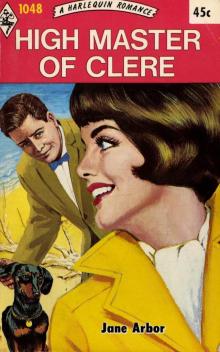 High Master of Clere
High Master of Clere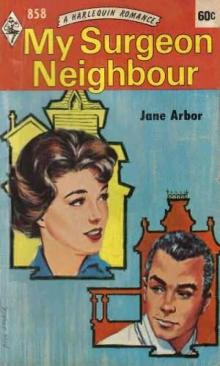 My Surgeon Neighbour
My Surgeon Neighbour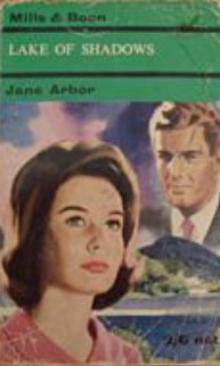 Lake of Shadows
Lake of Shadows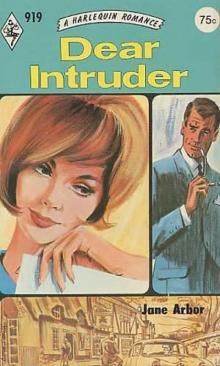 Dear Intruder
Dear Intruder Flash of Emerald
Flash of Emerald Return to Silbersee
Return to Silbersee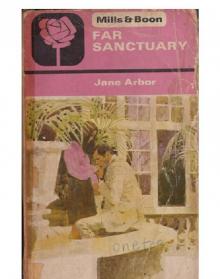 Far Sanctuary
Far Sanctuary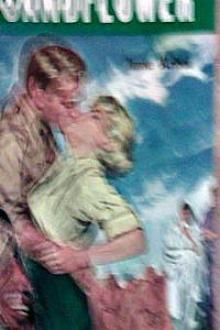 Sandflower
Sandflower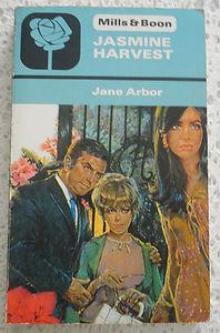 Jasmine Harvest
Jasmine Harvest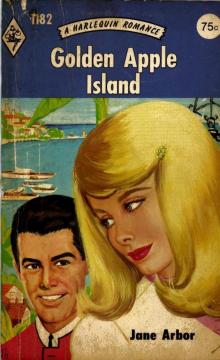 Golden Apple Island
Golden Apple Island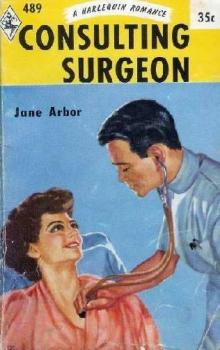 Consulting Surgeon
Consulting Surgeon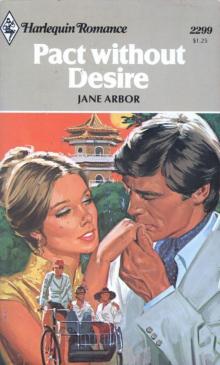 Pact without desire
Pact without desire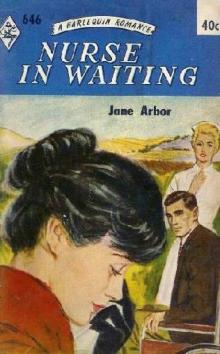 Nurse in Waiting
Nurse in Waiting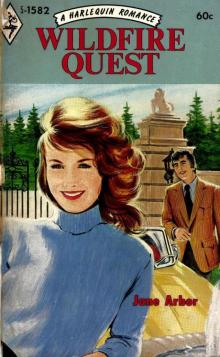 Wildfire Quest
Wildfire Quest Roman Summer
Roman Summer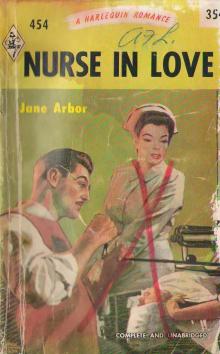 Nurse in Love
Nurse in Love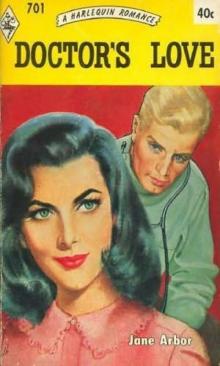 Doctor's Love
Doctor's Love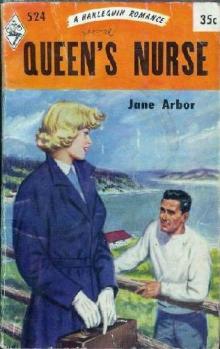 Queen's Nurse
Queen's Nurse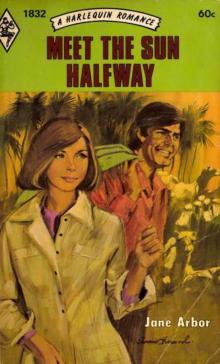 Meet the Sun Halfway
Meet the Sun Halfway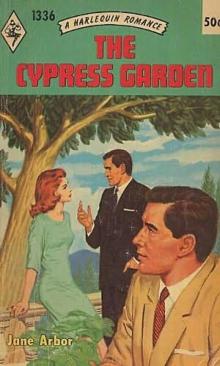 The Cypress Garden
The Cypress Garden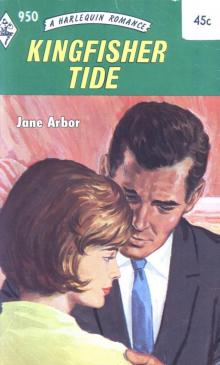 Kingfisher Tide
Kingfisher Tide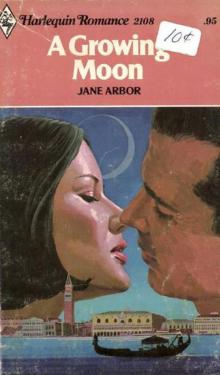 A Growing Moon
A Growing Moon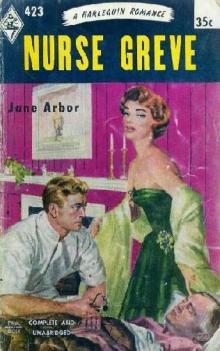 Nurse Greve
Nurse Greve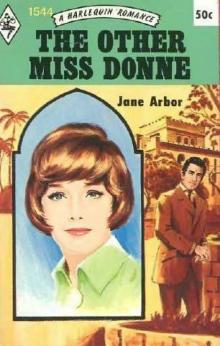 The Other Miss Donne
The Other Miss Donne